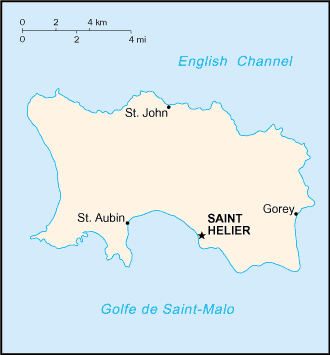Legend:
 Definition
Definition
 Field Listing
Field Listing
|
Background:
|


The island of Jersey and the other Channel Islands represent the last remnants of the medieval Dukedom of Normandy that held sway in both France and England. These islands were the only British soil occupied by German troops in World War II.
|
|
Population:
|


89,775 (July 2002 est.)
|
|
Age structure:
|


0-14 years: 17.9% (male 8,287; female 7,729)
15-64 years: 67.3% (male 30,099; female 30,347)
65 years and over: 14.8% (male 5,729; female 7,584) (2002 est.)
|
|
Population growth rate:
|


0.44% (2002 est.)
|
|
Birth rate:
|


10.86 births/1,000 population (2002 est.)
|
|
Death rate:
|


9.22 deaths/1,000 population (2002 est.)
|
|
Net migration rate:
|


2.78 migrant(s)/1,000 population (2002 est.)
|
|
Sex ratio:
|


at birth: 1.08 male(s)/female
under 15 years: 1.07 male(s)/female
15-64 years: 0.99 male(s)/female
65 years and over: 0.76 male(s)/female
total population: 0.97 male(s)/female (2002 est.)
|
|
Infant mortality rate:
|


5.52 deaths/1,000 live births (2002 est.)
|
|
Life expectancy at birth:
|


total population: 78.78 years
female: 81.4 years (2002 est.)
male: 76.34 years
|
|
Total fertility rate:
|


1.57 children born/woman (2002 est.)
|
|
HIV/AIDS - adult prevalence rate:
|


NA%
|
|
HIV/AIDS - people living with HIV/AIDS:
|


NA
|
|
HIV/AIDS - deaths:
|


NA
|
|
Nationality:
|


noun: Channel Islander(s)
adjective: Channel Islander
|
|
Ethnic groups:
|


UK and Norman-French descent
|
|
Religions:
|


Anglican, Roman Catholic, Baptist, Congregational New Church, Methodist, Presbyterian
|
|
Languages:
|


English (official), French (official), Norman-French dialect spoken in country districts
|
|
Literacy:
|


definition: NA
total population: NA
male: NA
female: NA
|
|
Economy - overview:
|


The economy is based largely on international financial services, agriculture, and tourism. Potatoes, cauliflower, tomatoes, and especially flowers are important export crops, shipped mostly to the UK. The Jersey breed of dairy cattle is known worldwide and represents an important export income earner. Milk products go to the UK and other EU countries. In 1996 the finance sector accounted for about 60% of the island's output. Tourism, another mainstay of the economy, accounts for 24% of GDP. In recent years, the government has encouraged light industry to locate in Jersey, with the result that an electronics industry has developed alongside the traditional manufacturing of knitwear. All raw material and energy requirements are imported, as well as a large share of Jersey's food needs. Light taxes and death duties make the island a popular tax haven.
|
|
GDP:
|


purchasing power parity - $2.2 billion (1999 est.)
|
|
GDP - real growth rate:
|


NA%
|
|
GDP - per capita:
|


purchasing power parity - $24,800 (1999 est.)
|
|
GDP - composition by sector:
|


agriculture: 5%
industry: 2%
services: 93% (1996)
|
|
Population below poverty line:
|


NA%
|
|
Household income or consumption by percentage share:
|


lowest 10%: NA%
highest 10%: NA%
|
|
Inflation rate (consumer prices):
|


4.7% (1998)
|
|
Labor force:
|


57,050 (1996)
|
|
Unemployment rate:
|


0.7% (1998 est.)
|
|
Budget:
|


revenues: $601 million
expenditures: $588 million, including capital expenditures of $98 million (2000 est.)
|
|
Industries:
|


tourism, banking and finance, dairy
|
|
Industrial production growth rate:
|


NA%
|
|
Electricity - imports:
|


NA kWh
note: electricity supplied by France
|
|
Agriculture - products:
|


potatoes, cauliflower, tomatoes; beef, dairy products
|
|
Exports:
|


$NA
|
|
Exports - commodities:
|


light industrial and electrical goods, foodstuffs, textiles
|
|
Exports - partners:
|


UK
|
|
Imports:
|


$NA
|
|
Imports - commodities:
|


machinery and transport equipment, manufactured goods, foodstuffs, mineral fuels, chemicals
|
|
Imports - partners:
|


UK
|
|
Debt - external:
|


none
|
|
Economic aid - recipient:
|


none
|
|
Currency:
|


British pound (GBP); note - there is also a Jersey pound
|
|
Currency code:
|


GBP
|
|
Exchange rates:
|


Jersey pounds per US dollar - 0.6981 (January 2002), 0.6944 (2001), 0.6596 (2000), 0.6180 (1999), 0.6037 (1998), 0.6106 (1997); the Jersey pound is at par with the British pound
|
|
Fiscal year:
|


1 April - 31 March
|
|
Military - note:
|


defense is the responsibility of the UK
|
|
Disputes - international:
|


none
|
This page was last updated on 1 January 2002
|




